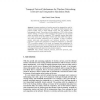Free Online Productivity Tools
i2Speak
i2Symbol
i2OCR
iTex2Img
iWeb2Print
iWeb2Shot
i2Type
iPdf2Split
iPdf2Merge
i2Bopomofo
i2Arabic
i2Style
i2Image
i2PDF
iLatex2Rtf
Sci2ools
ISCIS
2003
Springer
2003
Springer
Transport Protocol Mechanisms for Wireless Networking: A Review and Comparative Simulation Study
Increasing popularity of wireless services has triggered the need for efficient wireless transport mechanisms. TCP, being the reliable transport level protocol widely used in wired network world, was not designed with heterogeneity in mind. The problem with the adaptation of TCP to the evolving wireless settings is because of the assumption that packet loss and unusual delays are mainly caused by congestion. TCP originally assumes that packet loss is very small. On the other hand, wireless links often suffer from high bit error rates and broken connectivity due to handoffs. A range of schemes, namely end-to-end, split-connection and link-layer protocols, has been proposed to improve the performance of transport mechanisms, in particular TCP, on wireless settings. In this study, we examine these mechanisms for wireless transport, and discuss our comparative simulation results of end-to-end TCP versions (Tahoe, Reno, NewReno and SACK) in various network settings including wireless LANs a...
Related Content
| Added | 07 Jul 2010 |
| Updated | 07 Jul 2010 |
| Type | Conference |
| Year | 2003 |
| Where | ISCIS |
| Authors | Alper Kanak, Öznur Özkasap |
Comments (0)

